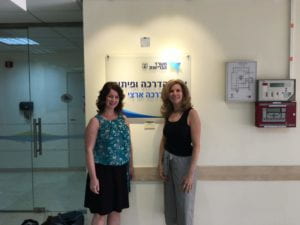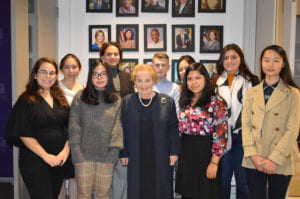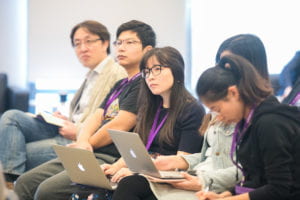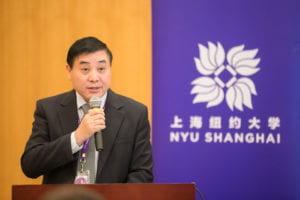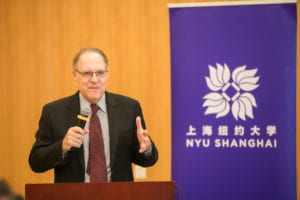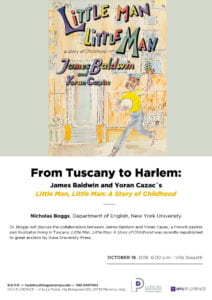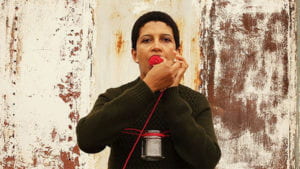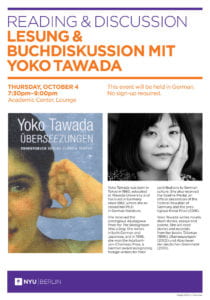Around 5,000 students have spent a semester at NYU Prague over the past 20 years. We contacted a few to find out how their time in Prague affected the trajectory of their lives. Here are their stories:
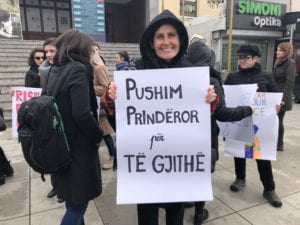 Nicole Farnsworth (Fall, 2001)
Nicole Farnsworth (Fall, 2001)
Seventeen years ago, I was enjoying similar brightly-colored fall leaves while hiking amid castles, the company of new friends and inspiring lectures at NYU in Prague. That fall provided several opportunities that have influenced my life. I heard the very inspiring activist and late President Vaclav Havel, together with the Dalai Lama and other leaders speak at Forum 2000. I learned of the plight of Romani people and went on to research their access to education. Studying women’s rights in transition in post-socialist contexts, as well as the Czech Republic’s EU Accession process provided a useful foundation for my future work.
Perhaps the most life-altering opportunity that studying in Prague provided was proximity to Prishtina. Seventeen years ago this month, I begged my parents for what some may consider an unusual birthday present: a plane ticket to see Kosovo’s first democratic elections. I was fascinated by the United Nation’s experiment in governing post-war Kosovo. If I had not been in Prague, I would not have had such a unique opportunity to witness a (not-yet-recognized) country’s first elections.
After completing my BA, I persistently sought to return to Kosovo. Eventually, I secured a position at a local civil society organization (CSO), supported by the East-West Management Institute (EWMI) with funds from USAID, to strengthen Kosovo CSOs’ advocacy capacities. Since then, I have continued consulting for EWMI, among others, in various civil society support initiatives worldwide.
The vast majority of my last 16 years has been spent with the Kosovo Women’s Network, a network of 138 diverse women’s groups working to further women’s rights. As Program Director / Lead Researcher, I have (co)authored 24 publications on issues related to gender equality, several of which have informed new laws and policies in Kosovo’s state-building process.
In my work, I regularly have drawn from my knowledge gained in Prague, particularly in advocating for Kosovo’s EU Accession process to attend to the needs of both women and men; writing about the position of women in post-socialist Kosovo; and volunteering for Roma rights organizations.
I’m often asked how I first came to Kosovo, and the story always starts with, “I was studying abroad at NYU in Prague…”
Nicole Farnsworth is the program director and lead researcher at the Kosovo Women’s Network.
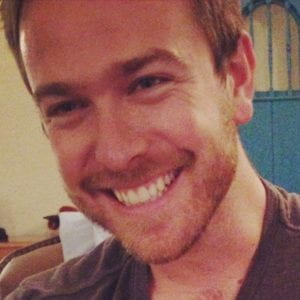 Brian Goodson (Fall, 2004)
Brian Goodson (Fall, 2004)
On a recent research trip to Prague, I returned to the neighborhood where many of us lived during our semester in fall of 2004. I was immediately relieved to discover that our nightly hangout B-52 was exactly as we’d left it, still weirdly decorated with airplane fuselage and parachutes. Nearby Krymska street is a different story. The Shakespeare a Synové bookshop has been replaced with the ultrahip Café v Lese, and the neighborhood is now teeming with
Generation Zed backpackers. Nearby, Žižkov still has its edge, but the rest of Prague feels much more polished these days. The hypercapitalist mall at Nový Smíchov has a 4-D movie theater. Sometimes I feel like I’m in Austria.
But I still can’t let go of Prague. Or is it the other way around? “Prague won’t let you go, the little mother has claws,” wrote the guy on all those souvenir t-shirts. Officially, the reason I return so often is because I’m writing a book about American and Czech writers during the Cold War. The seeds for this project were actually planted at NYU in Prague in 2004, in seminars taught by Tomáš Vrba and Jan Urban. At the time, I had no idea that my semester in Prague would change the trajectory of my life. Now I’m a professor at Arizona State University, which means I have a great excuse to escape the air-conditioned nightmare that is Phoenix in the summertime. But if I’m honest, the book is just an excuse. Prague is where I go to escape what Philip Roth called the “indigenous American berserk.” Prague is where I go to disappear.
Some things don’t change. In 2004, we all stayed up into the early hours to watch two major American events: the ALCS between the Yankees and the Red Sox and the election between John Kerry and George W. Bush. (Both my teams lost.) As I write this, the Yankees and Red Sox are about to face off in the playoffs for the first time since 2004. And we’ve got another election coming up on November 6th, which also happens to fall on the due date of my first child. Back in 2004, I remember buying two books at the bookshop on Krymska: The Man in the High Castle by Philip K. Dick and The Plot Against America by Philip Roth. Maybe my twenty-year-old self was on to something. It’s not too late to teach my future kid to speak Czech.
Brian Goodman got his PhD in American Studies from Harvard University. He is an assistant professor in the Department of English at the Arizona State University and is writing a book about the exchange of literature and culture between the USA and Czechoslovakia during the Cold War.
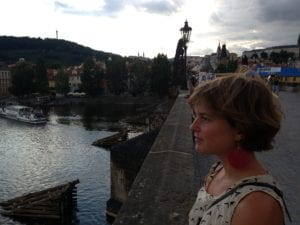 Meghan Forbes (Spring, 2005)
Meghan Forbes (Spring, 2005)
As a junior at NYU, I studied abroad in Prague. My initial interest in studying there was my mother’s Czech heritage — she grew up in a farming community of Oklahoma Czechs and my grandmother had preserved some knowledge of the language. I fell in love with the city of Prague, and its art and literature, the history of which had never been a subject of study back in the United States. Desiring to learn more, I continued to study Czech language, literature, and visual culture at the MA level at Columbia, and then for my PhD at the University of Michigan, Ann Arbor. I continue to travel to Prague ever year, and even had the opportunity in 2009-2010 to return to NYU in Prague as an employee! The friends on the fabulous staff there are still some of my closest in Prague.
Studying at a big university like NYU, I relished the more intimate environment of the Prague campus, and my experience there as an undergraduate has had an indelible mark on my life and career since.
Meghan Forbes earned a PhD from the University of Michigan, Ann Arbor with dissertation about the avant-garde in interwar Prague and Brno. She is now at the Museum of Modern Art in New York as a Contemporary and Modern Art Perspectives Fellow for Central and Eastern Europe.
Callum Voge (Fall, 2012)
As a student of international politics, I was intellectually attracted to the Czech Republic’s unique political history and transition to democracy. Having grown up in China, I especially wanted to learn about the differing experiences of communism in China and in Europe.
While at NYU Prague, I interned at a non-profit media organization called Project Syndicate where I produced content for the organization’s social media channels and conducted research on international media markets. After graduating from NYU, I had the opportunity to return to Project Syndicate for a full time position. I have now been working at Project Syndicate for four years and manage the organization’s external media partnerships in 50 countries.
Prague has always been a special place to me. The concentration of non-profit institutions and the large foreign community in Prague creates a unique environment – at times Prague feels like a very local city while at other times very global. Prague’s increasing internationalization over the past years has made it an exciting place to live. You only need to look at the city’s food scene to see the change. When I first moved from New York I could only dream of the restaurant diversity that I had known. Now I can easily have Indonesian food one night, Venezuelan another, and Georgian the next. The feeling that Prague is moving in the right direction makes it an exciting time to be here.
Callum Voge is the Senior Global Relations Manager at Project Syndicate, where he is also the internship mentor to current NYU Prague students.
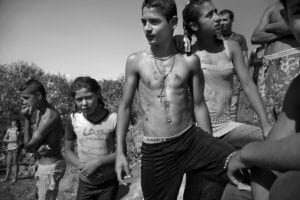
Kieran Kesner (Spring, 2013)
It wasn’t the first time I visited Prague and that’s probably why I decided to return. Prague represents the crossroads between the quintessential Western European study abroad experience and the Eastern European culture, which entwined with my own family history, so I was eager to explore.
Studying in Prague was as much a period of self-realization as it was an opportunity to live abroad and immerse myself in a different culture. It was at this intersection that I began to explore what inspired me most as a photographer, learning about and sharing other peoples stories. While studying abroad, I found those stories in the often misunderstood and much maligned Roma people, known to the outside world as Gypsies. Through significant research on my own and mentorship from local NYU professor, Ivana Dolezalova, I began traveling around the country on weekends and school vacations to spend time with Roma and experience first hand, their rich culture, and kind generosity. While prejudice and discrimination is a centuries-old narrative for the Roma, my personal experience strongly confronted the oppressive counter-narrative I was hearing. It was through this experience that I learned how the camera can provide a unique opportunity to interact and connect with people, often despite language barriers, that few other mediums share.
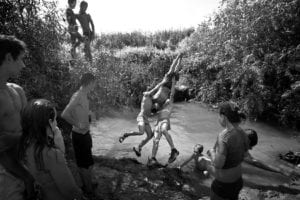 Today, I continue to work full time as a photojournalist and photographer/videographer for newspapers and magazines around the world as well as for commercial, corporate, non-profit and lifestyle brands. In the last year alone, I have traveled to over 20 countries for work assignments, feeding off a spark that began when I chose to study at NYU Prague, and which I hope will continue for many years to come.
Today, I continue to work full time as a photojournalist and photographer/videographer for newspapers and magazines around the world as well as for commercial, corporate, non-profit and lifestyle brands. In the last year alone, I have traveled to over 20 countries for work assignments, feeding off a spark that began when I chose to study at NYU Prague, and which I hope will continue for many years to come.
Kieran Kesner is an award-winning photographer, videographer and visual storyteller based in Boston. His work has been published in numerous publications including the Boston Globe, The New Yorker, the Guardian, and the Wall Street Journal.
Short takes
You might remember the band “With Snack” which performed regularly in the Osadni basement during the spring 2014 semester. Former music students Aviv Goldgeier, Matti Dunietz, and Evan Lane are still in the progressive R&B band, which has been renamed Valipala and is based in New York City. They released their debut digital album, Mango City in 2017 (available at https://valipala.bandcamp.com/album/mango-city) and are releasing a new single on October 26, 2018.
One of the most well-known NYU Prague alumni is Ari Leff (Spring 2015)- now known as Lauv – a singer/songwriter whose single I Like Me Better has had over 100 million views on Youtube. Last June he was ranked as number one on Billboard’s Emerging Artists chart.
Another NYU Prague celebrity is Camila Mendes (Fall 2014), an actress who plays Veronica Lodge in the TV teen drama Riverdale, for which she won the she won the Teen Choice awards in 2017. She recently acted in the comedy film The Stand In, to be released in 2019.
Christina Ng (Spring 2009) is an editorial producer for CBS news, where she’s been employed since 2011. She’s also worked for CBS as a reporter and as assistant to anchor Diane Sawyer.
Hunter Nolan, (Spring 2012), was the cinematographer on Before the Flood, a climate change documentary directed by Fisher Stevens, produced by Leonardo DiCaprio and executive produced by Martin Scorsese. He also worked on the award winning documentaries Before the Flood, Sky Ladder and Racing Extinction.
In 2017, Kim Pham (Spring 2012 ) – entrepreneur and founder of Oxtale – was recognized as a Forbes 30 under 30 honoree for her work at Frontline, building VC platforms.
Allan Peng (Spring, 2016), who was active in the PragueCast and Prague Wandering blog, is now a producer at CBS News Radio, working on an upcoming podcast about polling, as well as other digital audio content.
Melanie Weisner, who studied vocal performance at NYU Prague in 2006, is now one of the top American female poker players. As of 2016, Weisner is ranked 38th on the Women’s All Time tournament money list.
